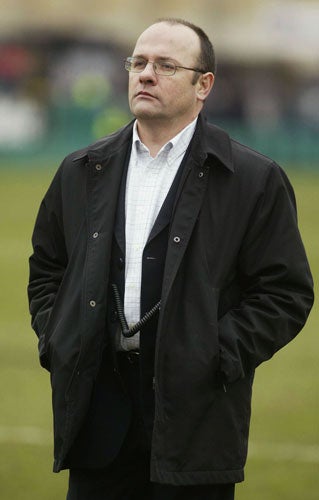Time to turn popularity into cash bonanza for club game

Your support helps us to tell the story
From reproductive rights to climate change to Big Tech, The Independent is on the ground when the story is developing. Whether it's investigating the financials of Elon Musk's pro-Trump PAC or producing our latest documentary, 'The A Word', which shines a light on the American women fighting for reproductive rights, we know how important it is to parse out the facts from the messaging.
At such a critical moment in US history, we need reporters on the ground. Your donation allows us to keep sending journalists to speak to both sides of the story.
The Independent is trusted by Americans across the entire political spectrum. And unlike many other quality news outlets, we choose not to lock Americans out of our reporting and analysis with paywalls. We believe quality journalism should be available to everyone, paid for by those who can afford it.
Your support makes all the difference.Stop for a second and listen. That thunder of feet you can hear is not a flanker chasing down a fly-half; it's the scramble of clubs and unions to cash in on rugby's apparently ever-increasing popularity.
If you're not listening, then take a look around. At Paris yesterday, where a capacity 80,000 crowd at the Stade de France watched a routine league match between Stade Français and Toulouse. Or east to Hong Kong, where those old buddies Australia and New Zealand will play a full Test next Saturday in front of a sell-out 40,000 attendance.
Or closer to home at Twickenham, which is being rented by Harlequins in December and London Wasps in January because their own grounds cannot handle the demand for tickets.
One influential thinker believes the clubs are in pole position in the drive for cash. Mark Evans, the chief executive of Harlequins – who have gone from crowds of 3,000 to 12,000 (half of whom have season tickets) in a few years – says: "The only way rugby can keep growing is at club level. I think it's a pretty strong story to tell, when you show the figures of growth, whether it's attendance or turnover or season tickets or viewing figures."
Traditionally, the unions were the powerhouses of money-making, and though Evans argues their markets are static, they are trying. Australia and New Zealand have talked of a Test in the US, and the Wallabies will face the Barbarians at Wembley in December. At Twickenham, a 156-room hotel with six VIP suites overlooking the pitch opens this winter. Lansdowne Road in Dublin is being rebuilt.
Evans is not so sure. "It takes such a long time to grow another international country, in the right time zone, with the stadiums and television market. Where do you go? Germany, Spain? That's a couple of generations' worth of work. In many ways you've got really hard work to do in Italy and Scotland. But clubs? Wales [the regions] are nearly out of the woods and Ireland [the provinces] are there. And you look at the French market and it's staggering, the crowds, the turnover.
"I looked at Chalon sur Saône and they're in the equivalent of the third division, with a budget of €1.3 million [£1m]," Evans adds. "It tells me that the most important relationship for the growth of rugby union is between the English and French clubs."
Evans predicts a continuing "battle for slots in the calendar" with the unions, and a reformed European Challenge Cup, with English and French sides dropping down from the Heineken Cup in the style of the Champions' League and Uefa Cup. "International rugby has to be careful not to devalue its product," he says.
It is only a dozen years since Stade Français numbered their crowd in the dozens. Yesterday was the eighth time they have filled the Stade de France for a "home" match. Tickets start at an inflation-busting €5 (£4), and the punters get karaoke and free hats, flags and goodies by the truckload. It's an event. Racing Club in Paris and Lyon, Toulon and Marseilles are other centres of spending. Municipal bodies foot the bill for facilities, allowing clubs to invest in players and spectators. Unfashionable Montpellier have a new £40 million stadium, and Dan Carter is joining Perpignan at a reported £400,000 for six months.
"Our big problem in England is stadiums," says Evans. The telecoms entrepreneur Martin St Quinton bought a 25 per cent stake in Gloucester last week and said the priority was to increase Kingsholm's capacity to 20,000. Quins plan to draw 50,000 fans to Twickenham for the "big game" against Leicester; the target is 33,000 when Wasps host Leinster there. Saracens have discussed a move to London's Olympic Stadium, post-2012.
Of course, it's devil take the hindmost. Coventry, one of England's greatest clubs, are on the point of folding. And if the game keeps growing, don't we know what happens next? "It pushes up player wages, definitely, and that's a worry," says Evans. "The salary cap is designed to save clubs from themselves."
Join our commenting forum
Join thought-provoking conversations, follow other Independent readers and see their replies
Comments